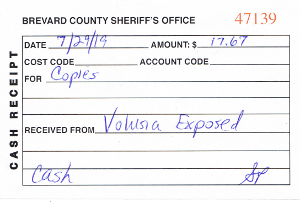| VOLUSIA EXPOSED.COM |
|
|
MURDERED BY THE BREVARD SHERIFF'S OFFICE? The In-Custody Death Of U.S. Military Combat Veteran Gregory Edwards Several Deputies Refused To Provide Sworn & Recorded Statements Sheriff's Office Refuses To Release Jail Surveillance Video OR Internal Affairs Investigation |
August 12, 2019 |
|
Only To Be Executed By The BCSO VolusiaExposed.Com first covered the in-custody death of U.S. combat veteran Gregory Edwards within our December 19, 2018 article. According to a Channel 6 media report, on December 9, 2018, while being booked into the Brevard County jail, Gregory Edwards, 38 suffered an apparent medical episode, after allegedly engaging in a physical confrontation with jail staff. A short time later, after having been transported to a local hospital, Mr. Edwards quietly died, without being able to provide his account of what transpired According to the recently released Medical Examiner's report, Mr. Edwards' manner of death was an "accident" - caused by "excited delirium and complications hyperactive and violent state with subsequent restraint".(see page 1 of M.E. Report) From this publication's perspective, we must openly question whether Edwards was outright murdered by Brevard deputies. Deputies, that were eager to please their sheriff, by dealing out "punishment" to a criminal suspect, that had allegedly injured a follow deputy. (more on this later) Secrets To The End Within our first article, we noted that the Brevard County Sheriff's Office (BCSO) was refusing to state whether they had used chemical agents or police tasers against Mr. Edwards. While the arresting agency, West Melbourne Police Department (WMPD) had no such reservations addressing these same questions within their December 14, 2018 email response to this publication. WMPD Deputy Chief of Police, Richard Cordeau advised VolusiaExposed.Com, that they had NOT used chemical agents or the taser while taking Mr. Edwards into custody. According to page 4 of the BCSO's criminal investigative report, we now know that jail deputies used both a taser and chemical agents against Mr. Edwards. However, other pages of the report clearly indicate that Mr. Edwards was subjected to much more force than merely a police taser and pepper spray. The documentation supports such things as "upper jaw thrusts", choke holds, and "knee strikes" (see page 14-15 of report) This publication has even received unverifiable accounts that Edwards was beaten to death with a deputy's service communication radio. It is of interest, that injuries noted on the autopsy report appear to have some consistency with such a beating. Fortunately, for truth seekers, those unverifiable accounts can either be quickly sustained, or unsustained, by viewing the available jail surveillance video. (more on this later) Was all this documented force really necessary to stop Edwards' alleged attack on Deputy Brian Otto (see page 10 of report)? We may never actually be able to fully address whether the force used against Edwards was within reason. Why? Because at least three of the principle deputies involved in the application of force against Mr. Edwards refused to provide sworn and recorded statements to BCSO CRIMINAL investigators. These deputies are: 1. Lt. George "knee strikes" Fayson (see page 19 of report) 2. Deputy Robert "fist blows" Wagner, Jr. (see page 14 of report) 3. Deputy Allison "taser" Blazewicz (see page 19 of report) With the principle deputies opting not to provide sworn statements within the "criminal" investigation into Mr. Edwards' death, the jail's video surveillance camera could act as a great counter balance to the deputies' silence. We know the video exist, because it is mentioned within the completed investigative report. Further evidence of it's existence can be found within an email that the State Attorney sent to this publication. |
Click Here To Review BCSO Criminal Investigative Report Summary IF THIS PDF FILE DOESN'T FULLY OPEN - PLEASE TRY ANOTHER BROWSER, LIKE M.S. INTERNET EXPLORER, OR CHROME 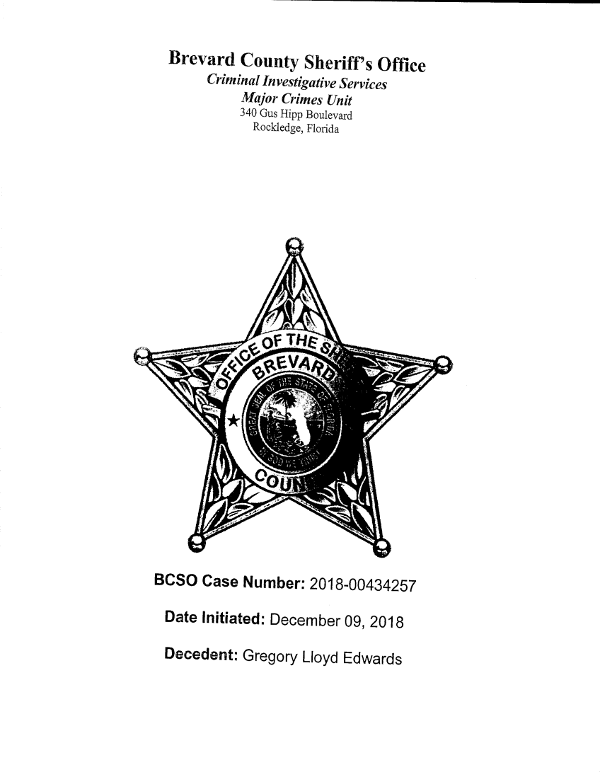
---------- Click Here To Review State Attorney's Letter 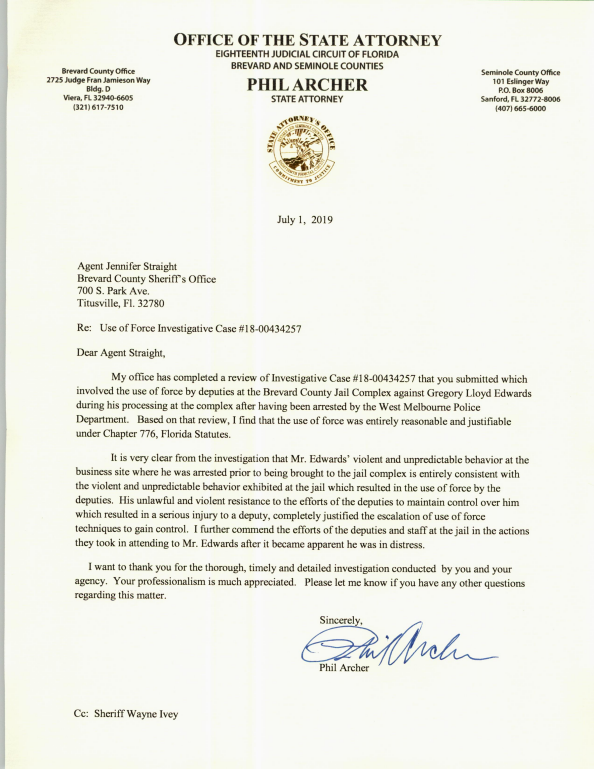
---------- Click Here To Review Medical Examiner's Report 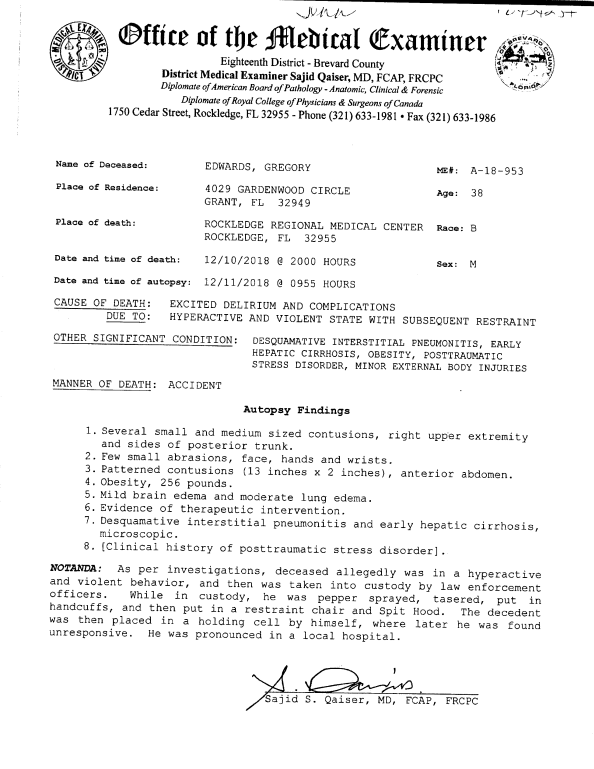
---------- Click Here To Review Sheriff's Office Media Release 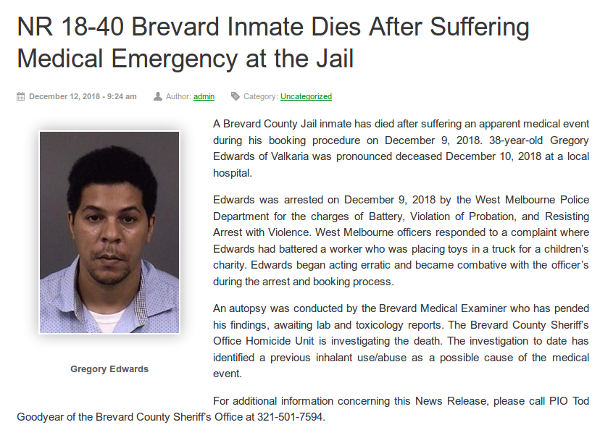
|
|
Within a July 23, 2019 email, Mr. Todd Brown, the public information officer for the State Attorney's Office, advised this publication that they had custody of the jail surveillance video, however, the Sheriff's Office was declaring a statutory exemption that would prohibit the release of the video to the public.
This statutory exemption that the Brevard County Sheriff's Office is declaring - can be waived. The exemption prevents the releasing of ALLEGED intelligence information that could compromise the jail's surveillance or fire safety systems. Fortunately, Sheriff Wayne Ivey is a media hound. Sheriff Ivey writes for a local on-line publication, and he maintains a rather high profile on many social media networks. In his video series "Behind The Bars" - he has his deputies conduct documentary style tours of the Brevard County jail. |
|
In a recently obtained episode of "Behind The Bars" - Cpl Collins does a documentary on the booking area of the Brevard County jail. --> We invite our readers to watch the attached BCSO documentary video. This video clearly reveals much more information about the jail's surveillance and fire / security system, than would have been revealed by any mere surveillance video of the Edwards' incident. |
Behind The Bars - Booking With Cpl. Collins |
|
Given the "Behind The Bars" video series, it is obvious, that Sheriff Ivey is not against the public seeing the inside of his jail - with the apparent exception of when a U.S. combat veteran is being apparently murdered by BCSO deputies. Surely, since the Edwards surveillance video was provided to the State Attorney's Office for their review - the video should provide evidence that the deputies' applications of force against Mr. Edwards were reasonable, and within the law. It would also identify all the participants, in the application of force against Mr. Edwards. So why not release the video? Dealing Out Punishment |
|
Sheriff "Media Hound" Ivey has absolutely no problem making political hay, by using pictures and videos detailing his deputies "punishing" criminal suspects.
Within another recent article, this publication highlighted Sheriff Ivey's Facebook comments, suggesting that criminal suspect Timothy James Paul should have accepted his "punishment" from the BCSO. Last month, (July 2019) Mr. Paul was accused of committing domestic violence. Prior to his arrest, apparently, Mr. Paul fled the scene - causing a run in with one of BCSO's K-9 officers. --> During the December 2018 Edwards' incident - it has been alleged, that Edwards committed battery against a deputy. According to official reports, there is a yet released jail surveillance video of deputies disengaging Edwards from his battery upon the deputy. Isn't it interesting, that by the BCSO refusing to release the jail surveillance video, Sheriff Ivey is denying the public the ability to watch the "punishment" that Edwards apparently suffered for committing battery against a deputy. Why is that? Could it be - that Sheriff Ivey realizes that there is no political hay to be made -in releasing a video depicting several of his deputies beating the life out of a U.S. military combat veteran? |
|
Police Videos Tend To Indict Many Police Officers The Los Angeles riots of 1992 were sparked by the video recorded, police beating of motorist Rodney King. Absent, the existence of that video, and the public's outrage over the police officers' misconduct would have never surfaced. Several LAPD officers involved in King's beating, would have never been tried and convicted of federal crimes. Nearly thirty years later, cellphone technology has placed a video recorder in almost everyone's hands. The Internet is alive with videos of police actions against citizens, resulting in many police officers being criminally charged with excessive use of force. |
|
Thankfully, at least from the police perspective, the concrete walls of police stations, jails, and prisons provided the police with a shield from the probing video lens of those pesky cellphones. With some exceptions, as was the case on June 8, 2019, within a Florida State prison, when prison inmates were successful, with a smuggled cell phone, in video recording one of these otherwise unknown police beatings. --->. Some of the above mentioned Florida prison officers are now facing criminal battery and false reporting charges. Absent, that smuggled prison cellphone video - those criminal charges would have never been filed. Video is very powerful investigative tool. |
June 8, 2019 Lake Correctional, Florida Corrections Officers Videoed Beating Prison Inmate |
|
With, the BCSO principle deputies "taking the 5th amendment", and given the past relevance of police video in properly determining whether police actions were within legal mandates - this publication is of the OPINION that the BCSO has an affirmative responsibility to provide the jail surveillance video for public viewing.
Within a July 31, 2019 email, this publication filed a public record request for the jail's surveillance video regarding the Edwards matter. The BCSO has not yet acknowledged, or responded, to our public record request. Vs. Internal Affairs Investigation There is no doubt that the BCSO conducted a "criminal investigation" into the in-custody death of Gregory Edwards, we know it to be a fact, because we have a copy of the completed investigative report*. |
 The Edwards & President Obama |
This publication offers much criticism as to whether the BCSO should have conducted this "criminal investigation". Why - well simple, because their (BCSO) own deputies are by default, criminal suspects regarding the manner of Mr. Edwards' death. How do we know this? Well, that is simple too, because that is how the three above deputies were able to avoid providing "sworn and recorded" statements regarding Mr. Edwards death. The fifth amendment to the U.S. Constitution forbids anyone to be forced to provide a statement that may incriminate themselves in a crime.
However, police internal affairs investigations, because they are administrative, rather than criminal in nature, operate under a different set of rules. These different "rules" regarding internal affairs investigations have their roots within the 1967 U.S. Supreme Court decision - "Garrity v. New Jersey". |
|
Under the "Garrity" decision - police officers are REQUIRED to submit themselves to sworn questioning by members of their law enforcement agency. However, any self-incriminating statements secured during these mandated testimonials can NOT be used to criminally prosecute the law enforcement official. (Not Legal Advice - Should Not Be Taken As Legal Advice - Please Seek Legal Counsel !)
However, since the BCSO investigators were conducting a "criminal" investigation, rather than an administrative internal affairs investigation, the three subject officers could merely "plead the fifth" and opt not to provide a sworn statement regarding their participation in the "use of force" against Mr. Edwards. If you can't dazzle them with brilliance, baffle them with bullshit ! In our OPINION, many times a law enforcement agency will opt to "skip" any type of "administrative review / investigation" into these types of high profile events. In lieu of an "administrative" investigation, they will resort to conducting a "criminal" investigation, while at the same time "encouraging" their employees to seek legal counsel, which usually leads to their counsel advising the employees not to provide a sworn statement - as is allowed under the 5th amendment of the U.S. Constitution. This "refusal" to provide a sworn statement actually works to the employing agency's (law enforcment agency) advantage, because these "non-existent" statements are never immediately available to any civil attorney, that may wish to file suit against the law enforcement agency. These completed "criminal" investigations are really nothing but sham investigations, that are used as the "red meat" that the law enforcement agencies throw to the media, and the public, in order to relieve any concerns whether these high profile events were "properly investigated". It also doesn't hurt, as in this case, to have the local State Attorney draft a nice letter thanking the law enforcement agency for the fine job it did in investigating, and clearing itself of suspected criminal activities. Generally, the public has no knowledge, or understanding, that these high profile events are mandated to be both criminally, and administratively investigated. If the law enforcement agency decides to merely "skip" the administrative investigation, which appears to be the case within the Edwards' incident, the public is usually none the wiser. This is especially true, if the local State Attorney's Office has also given the "investigation" a "thumbs up", thus "baffling" the public into accepting the agency's "investigative" findings. When Florida Law Enforcement Agencies Must Conduct An Administrative Internal Investigation |
|
While some in law enforcement believe that "they" have the option not to conduct an "administrative" investigation into possible misconduct within their agency, ..... per State statute, at least in Florida, that doesn't appear to be true. (OUR NON-LEGAL OPINION - seek legal counsel) The Criminal Justice Standards & Training Commission (CJSTC), a subsection of the Florida Department Of Law Enforcement (FDLE) is the governing body for law enforcement in the State of Florida. According to Florida Statutes (see right of page) if a law enforcement agency "suspects" that an officer has committed misconduct, they must conduct an investigation into their suspicions and report any sustained findings to the CJSTC. Without getting into too much detail, other supportive Florida Statutes, and Florida Administrative Code, lay out this rather complex administrative procedure of internally investigating law enforcement misconduct. |
|
After reviewing the records that the State Attorney's Office provided us, this publication could not locate a copy of the BCSO Internal Affairs Investigative report on the Edwards' death. Furthermore, we could not locate a mandated "Use Of Force (UOF)" investigation, within the documents supplied to us by the State Attorney's Office. These UOF investigations are also administrative in nature, and are mandated within BCSO policies and procedures. Within a July 23, 2019 email correspondence with State Attorney's Office (SAO) representative Todd Brown, this publication questioned Mr. Brown, as to whether the BCSO had provided the SAO with a copy of the "internal affairs" investigation into Mr. Edwards' in-custody death. We further expressed our belief regarding the importance of an "internal affairs" investigation being available. Within Mr. Brown's response, he invited us to reach out to the BCSO for any other documents they may have regarding the Edwards' matter. Within a July 22, 2019 email to the Brevard County Sheriff's Office, this publication requested a copy of the BCSO Internal Affairs Investigation. Within a July 25, 2019 email response, the BCSO sent this publication an invoice in the amount of $17.67, in order for them to produce their "internal affairs" report regarding the Edwards' in-custody death. On July 29, 2019, as per a sheriff's office receipt, this publication paid the required $17.67. As of the posting of this article, this publication has NOT received a copy of the BCSO's internal affairs investigative report into the in-custody death of Mr. Gregory Edwards. |
|
Obviously, the first, and probably most important conclusion, is that the BCSO, should have NEVER conducted the criminal investigation into Mr. Edwards' death. It is clear, that several BCSO deputies where the subjects of this criminal investigation. Adding insult to injury, the BCSO had important investigative evidence in their custody (jail surveillance video), that should have been evaluated by a non biased, un-involved, and independent law enforcement agency, prior to any investigative conclusions being authored. Further, by BCSO assigning itself as the "criminal investigative" body - it is reasonable to conclude that witnesses and principles to the event, could have been instilled with a fear, that truthful testimony regarding the event, might not be well received by the BCSO, thereby, possibly opening them up (witnesses & principles) to criminal jeopardy. Witnesses, especially in a criminal investigation, MUST believe that the investigative agency will fully and fairly investigate the incident. The sheriff's office is a political office, facing a pending re-election cycle. It would not have been politically beneficial for Sheriff Wayne Ivey to discover that his deputies committed acts of excessive battery on an American combat veteran. In our OPINION, and in the opinion of others, the BCSO should have conducted their mandated internal affairs investigation - under the mandates of the Garrity decision, while allowing another un-involved agency (FDLE?) to conduct the criminal investigation into the events surrounding Mr. Edwards' death. Since no "internal affairs" investigation has been presented to us - we are left to wonder whether the BCSO's self review (aka "investigation") of Edwards' in-custody death complied with statutory mandates. This publication is of the OPINION that BCSO apparent failure to properly investigative this incident was purposeful, with the intent, to ignore and hide significant testimony and evidence surrounding Mr. Edwards' in-custody death. Due to BCSO's failure to present the mandatory "internal affairs" investigation - that would have mandated sworn statements from all the principle deputies - coupled with their refusal to release the jail surveillance video, and regardless of how mighty the SAO may praise the BCSO investigation - this publication finds the BCSO's investigation severely lacking - fairly calling into question whether BCSO deputies outright murdered Mr. Edwards (OUR OPINION). Rest in peace Mr. Edwards - the public will not forget your service to our country - we shall continue to demand ALL the records regarding your treatment within the Brevard County jail. Stand by to stand by .... there is surely more to come of this......roger...wilco...and out. We look forward to your comments on this situation. Drop us a line to let us know what you think.  EMAIL US |


